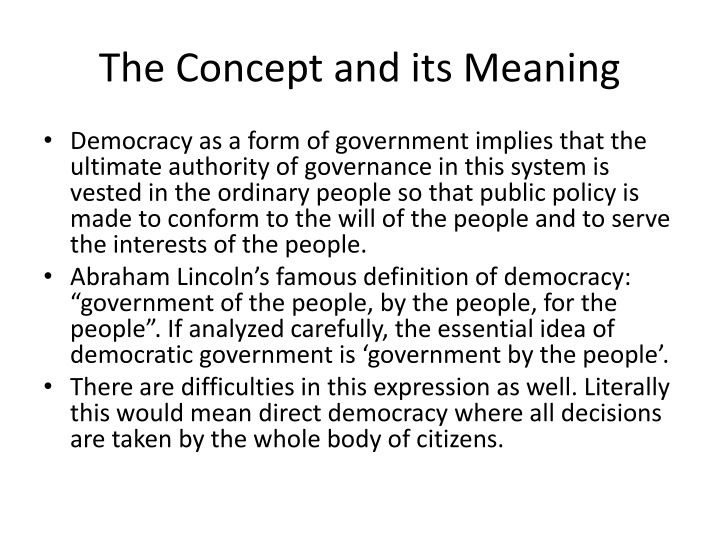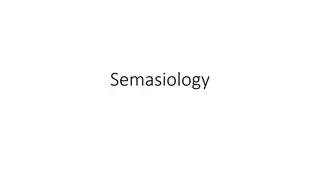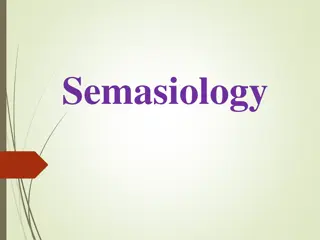The Concept and its Meaning
Democracy as a form of government emphasizes governance vested in the ordinary people, with public policy aligning with their will and interests. The evolution from direct to representative democracy addresses challenges in decision-making, with a balance needed between majority rule and minority rights. In a multicultural society, democracy calls for respecting and safeguarding the rights of diverse minorities to maintain their cultural identity. The concept of democracy is compared to meritocracy, highlighting the importance of safeguarding against manipulation and demagoguery.
Download Presentation

Please find below an Image/Link to download the presentation.
The content on the website is provided AS IS for your information and personal use only. It may not be sold, licensed, or shared on other websites without obtaining consent from the author.If you encounter any issues during the download, it is possible that the publisher has removed the file from their server.
You are allowed to download the files provided on this website for personal or commercial use, subject to the condition that they are used lawfully. All files are the property of their respective owners.
The content on the website is provided AS IS for your information and personal use only. It may not be sold, licensed, or shared on other websites without obtaining consent from the author.
E N D
Presentation Transcript
The Concept and its Meaning Democracy as a form of government implies that the ultimate authority of governance in this system is vested in the ordinary people so that public policy is made to conform to the will of the people and to serve the interests of the people. Abraham Lincoln s famous definition of democracy: government of the people, by the people, for the people . If analyzed carefully, the essential idea of democratic government is government by the people . There are difficulties in this expression as well. Literally this would mean direct democracy where all decisions are taken by the whole body of citizens.
The Concept and its Meaning (Contd.) But in modern times, the states are so large that direct democracy is impracticable. So a system of indirect representative democracy with largely universal political rights has evolved. Now it is government by the people through their representatives who are chosen for a definite period. Though ideally speaking, public decisions should be taken with the approval of all the people. But this is again not a practicable proposition. So we have a situation where people s representatives are elected by a majority vote. Then public decisions by these representatives have to be taken by a majority vote as they would be rarely unanimous.
The Concept and its Meaning (Contd.) Thus the strength of people who actually approve of a particular decision is further diluted. It may only be hoped that despite wide diversities and differences of opinion on minor issues, all public decisions in a democracy would be taken for the people , i.e. in the interests of the people. However, if views and interests of the minority are not taken in to consideration it would cease to be a democracy. Majoritarianism is no democracy. The principle of democracy requires that while public decisions are taken with the approval of the majority, due regard may be given to the views and interests of the minority.
The Concept and its Meaning (Contd.) On essential issues, it is all the more needed to accommodate the opinion of minority. Under normal conditions, where there is a free flow of information and freedom to influence public opinion, those who are in minority today may be in majority tomorrow and vice versa. Therefore, majority and minority need to give regard to each other and live in a responsible and cordial atmosphere. In a multicultural society, the principle of democracy requires that different minorities such as racial, religious, linguistic or cultural minorities enjoy full freedom to preserve their cultural traits and feel fully safe.
Democracy Vs Meritocracy Democracy as government by the people is dependant heavily on the wisdom of the people. It is based upon the conviction that there are extraordinary possibilities in ordinary people. But there is also a possibility that they are swayed by emotions. More often than not they are misled by demagogues. Therefore, in some quarters, it is suggested that democracy as the rule of mediocre should be replaced by a better system like meritocracy, i.e. government by those who have proved their competence.
Democracy Vs Meritocracy (Contd.) The idea of meritocracy was introduced by Michael Young ( The Rise of Meritocracy, 1958). Meritocracy implies a system of occupational hierarchy where each person will get his/her appropriate position according to qualifications, competence and character, rather than on the basis of age, gender, race or inherited wealth. It is interesting to know that Young, himself, felt that such a system would denude the working class of its culture and its leadership. Critics argue that democracy would be more conducive to social development than the proposed system of meritocracy.
Classical Notion of Democracy In the long tradition of democracy evolving from ancient times the notions regarding its essence and grounds of its justification have been revised from time to time. During the time of Plato and Aristotle democracy was at work in some of the ancient Greek city-states, especially at Athens. The main features of such democracy were: i. Equal participation by all freemen in the common affairs of the polis (city-state) which was regarded as an essential instrument of good life;
Classical Notion of Democracy (Contd.) ii. Arriving at public decisions in an atmosphere of free discussion; and iii. General respect for law and for the established procedures of the community. The Greeks took pride in their customary law and distinguished it from the arbitrary rule prevalent among the barbarians . Plato and Aristotle had scant respect for democracy. They, indeed, had a kind of hatred for democracy as a system of rule.
Classical Notion of Democracy (Contd.) The form of democracy prevalent in ancient Greek city- states would hardly be termed as democracy as per our modern standards. Roughly, 10 per cent of the population were considered to be citizens. Women, slaves and non- Greeks were excluded from the category of citizens. With the dawn of modern political thought, Machiavelli, in his Discourses (1531) and Montesquieu, in his The Spirit of the Laws (1748) took democracy to be a pure form of government that could be safely incorporated into statecraft only as one component of a mixed republican constitution.
Classical Notion of Democracy (Contd.) Later on the early exponents of the theory of social contract such as Hobbes and Locke sought to base political legitimacy on the consent of the people. Social contract theory offered a challenge to the traditional dictatorship and the divine right of kings. State came to be recognized as an artificial and mechanistic creation of people which was meant to serve their own interests. Thus, the state was created by entering into a contract in order to secure the protection of their natural liberty and natural rights. Social contract theory laid the foundations for later democratic theory.
Rousseaus Concept of the General Will and Popular Sovereignty Then Jean Jacques Rousseau, a French philosopher and another brilliant exponent of social contract theory, introduced the idea of popular sovereignty and became an eminent early theorist of democracy. Rousseau s theory of popular sovereignty is based on his concept of General Will. According to him the state is not only a product of the General Will, it continues to function under the guidance of the General Will. General Will is the sum-total of all the real wills in a society. In order to explain the concept of General Will Rousseau makes a distinction between real will and actual will.
Rousseaus Concept of the General Will (Contd.) When an individual is motivated by one s momentary self-interest, s/he is acting on actual will which is against the General Will. On the contrary, a person decides to act in the common interest one is acting on one s real will which is in consonance with the General Will. Rousseau was very critical of representative democracy and he was an exponent of direct democracy. But his concept of the General Will is criticized of being vague as Rousseau fails to explain clearly the method by which one can procure General Will.
Contemporary Scenario: Liberalism and Democracy !8thcentury onwards democracy has come to be regarded as a moral standard by which regimes were judged rather than merely as one of the forms of government. However in actual practice, democracy was first established in the Western world only during the nineteenth century. In the beginning the term stood for representative government where election of representatives was held by a competitive vote.
Contemporary Scenario: Liberalism and Democracy (Contd.) But right to franchise was very limited which was gradually extended later on. In modern times liberal democracy has become the most popular form so much so that the term democracy is generally applied to denote liberal democracy . Liberalism is a principle which regards liberty of the individual as the first and foremost goal of public policy. In this sense, liberty implies liberation from restraint, particularly from the restraints imposed by an authoritarian state.
Contemporary Scenario: Liberalism and Democracy (Contd.) John Locke is regarded as the father of liberalism. In his view, human beings are born with three natural rights- right to life, right to liberty and right to pursuit of happiness (right to property)- which are given to them by nature. State was created to protect these rights and thus, it was a limited state, a non-interventionist state, only to maintain law and order in society. Early liberalism sought to win political rights for the new entrepreneurial class which paved the way for the rise of capitalism.























